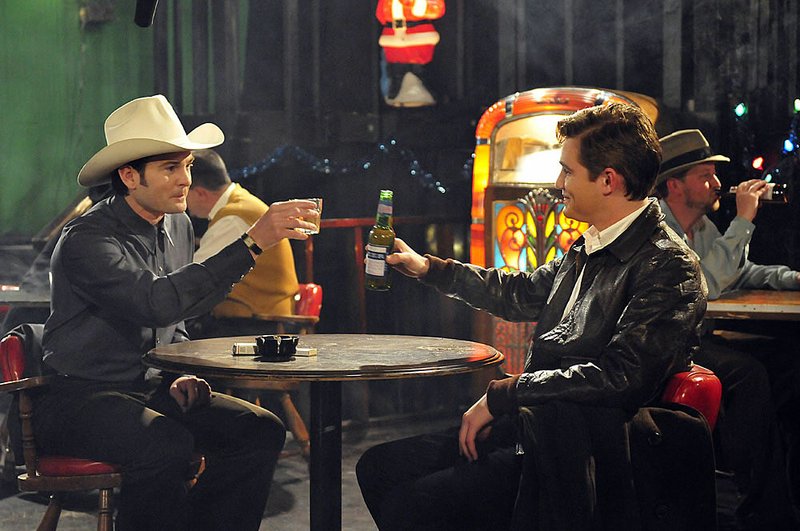LITTLE ROCK — Maybe the first thing I should say about Harry Thomason’s The Last Ride is that I’m not sure I ought to be reviewing it because I know (and am fond of) a great many people involved in its making.
I am not close with Thomason, but I enjoy him and appreciate his considerable efforts on behalf of his home state. He serves as a kind of godfather to a burgeoning Arkansas film industry and he merits more than Oedipal attention for his trouble.
Additionally I consider one of the executive producers (Tim Jackson) enough of a friend that I’ve asked favors of him. He speaks to classes when I ask. We go to lunch sometimes for no particular reason. I can’t say a bad word about him and I won’t: If I didn’t like The Last Ride I wouldn’t be writing about it, so if you’re expecting an “objective” review (and some people apparently do expect the impossible), you won’t get one here.
Many of you are probably like me: You know that The Last Ride was filmed primarily in Arkansas and a lot of local people contributed their talents. Knowing what you know necessarily colors the way you will perceive the movie - you might desperately want it to succeed or you might wince at the idea of a local, low-budget project. Reasonable people of good will can disagree about the merits of any particular work of the imagination but it’s worth acknowledging not only one’s affinity for the home team but the tendency of certain Arkansans to reflexively dismiss anything from Arkansas as inferior.
I not only like The Last Ride, I am proud of it. I’m proud of it even though I understand that there are people who will find it underwhelming and corny. People who find the way it employs green screen special effects amateurish. People who apparently take no joy whatsoever in it.
Fair enough. Maybe if I didn’t want the movie to do well I might feel the same way. But I’ve watched it a few times now, and the only thing I can tell you is I’ve liked it better each time.
Above all, The Last Ride is a deeply interesting movie.It’s “about” the final days of Hank Williams, but it neither slavishly follows the known “facts” nor indulges the more sensational rumors (such as the shadowy doctor allegedly traveling with Williams) that have gathered about the case. While we hear snatches of Williams’ voice and some of his songs (generally performed by others) in the film, the singer (Henry Thomas) is referred as “Mr. Wells,” an alias Williams occasionally used, or as “Luke,” a reference to Williams’ recording pseudonym “Luke the Drifter.”
And Silas Combs (Jesse James), the character who serves as Mr. Wells’ driver, bears little resemblance to the 17-year-old Auburn University freshman who actually drove Williams during his final 48 hours of life. Otherwise the film leaps off from a few well-known episodes - the stations of the Hillbilly Jesus’ particular cross - to catch the “truth” of what has been installed as a folkloric myth as potent as Robert Johnson’s selling his soul to the devil at the crossroads.
But The Last Ride is less a fable about an icon - and Williams was one of the most important Americans of the 20th century - than a sort of love story about two damaged young men who are thrown together, squabble and in the end manage to matter to each other. Thomason does the best thing you can do with this sort of material; you don’t make a movie about a legend, you make a movie about how a young man grows up just alittle after encountering, and getting to know, a stranger.
There is plenty in the movie for local folks to pay attention to (you’ll likely be amused at the familiar sights that double for Knoxville, Tenn., hotels and the like). And the actors develop a credible friendship, with Thomas particularly good at suggesting swaggering frailty. His Mr. Wells has the grin of a Dia de los Muertos skeleton, the snake-narrow eyes of a man who has seen his share and knows he’ll never get out of this world alive.
The soundtrack, curated by Benjy Gaither, contains some slightly anachronistic modern covers of Williams’ songs, a couple of which are sung by Jett Williams, the singer’s daughter born five days after his death. This sets up a harmonic resonance, a kind of echoing effect between past and present. It might be stronger for not including (the prohibitively expensive) Hank Williams originals.
The movie’s highest and best use is as an evocation of an era, of a lost-highway America evidenced today only in the roadside ruins of old service stations and downtown hotels, of a South before it was swamped by leveling and homogenizing waves of globalization and television.
Not only does the film show us this era, it feels a product of it, imbued with a kind of earnestness that might or might not play in bigger, more self-consciously sophisticated markets. Or to more self-consciously sophisticated souls.
But I liked it. A lot of people will.
MovieStyle, Pages 33 on 10/21/2011
